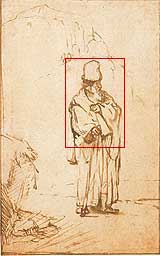A Still Small Voice
The theopany at Horeb is veiled in mystery. It is described through a series of negations; God is not in the wind, not in the earthquake, nor in the fire. God's closeness is felt in the still small voice. This notion is poignantly described in the following talmudic tale wherein the divine presence is experienced through silence:
Rav Sheshet (who was blind) heard that all the people went out to see the king. He too arose and went out with them. A heretic and ex-pupil said to him: The whole pitchers go to the river but where do the broken ones go? He said to him, Now you will see that I know more than you. They heard the sound of shouting. They said to him the king is coming. Rav Sheshet said to them: No. They heard more shouting and said the king is coming. Rav Sheshet said to them. No. Then they heard a still small voice. Said Rav Sheshet Now indeed the king is coming. They said to him How do you know. He replied: The royalty of this world is like that in heaven and how do we know that it is so with the heavenly royalty. For it is written: Come out, He called, "and stand on the mountain before the Lord. And lo, the Lord passed by. There was a great and mighty wind, splitting mountains and shattering rocks by the power of the Lord, but the Lord was not in the wind. After the wind -- an earthquake; but the Lord was not in the earthquake. After the earthquake -- fire; but the Lord was not in the fire. And after the fire -- a still small voice. (Berachot 58a)
But what was the nature of the still small voice? Ostensibly, it was an absence rather than a presence. Or perhaps as Rashi suggests it was 'une voix retentissaente' - an echo; suggesting that man merely experiences reverberations of the divine.
Perhaps the key to unlocking the cryptic still small voice is the contrast with the powerful forces, which preceded it -- wind, earthquake and fire. Elijah, a proponent of unequivocal divine justice was reminded through the still small voice of divine compassion. His moralizing fury was side stepped by God's mercy, acceptance and understanding.
The lesson of Horeb was the last lesson of leadership Elijah was offered. The dramatic zeniths of Mount Carmel are few and far between. They serve to spontaneously inspire the masses but require follow through. God's message to the prophet Elijah was that true leadership is in the ongoing challenges; the quiet moments of the every day. Patience and compassion, compromise and concession endow great leaders the forbearance to guide the people of Israel despite their shortcomings.
